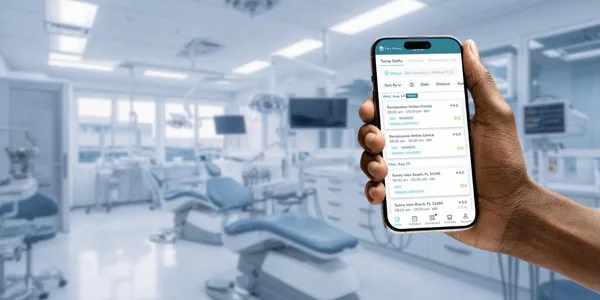This blog is to ensure that dental offices and professionals understand the GoTu dual model and assist in answering frequently asked questions.
Why has GoTu begun offering an “employee” option for platform workers?
We stand by our belief that our independent contractor model is often the best way to connect dental offices with experienced dental professionals who choose to offer services through the GoTu platform. That is why we still offer the option to connect with workers as independent contractors in the majority of states. However, it makes sense to offer a model where dental professionals can be classified as employees based on local rules and depending on the particular needs of a dental office.
How will this impact professionals working for our offices?
In practice, not much. The two big differences will be that professionals who want to work employee shifts in these states will have to be onboarded through our PEO. This process should take around 5-10 minutes to complete & will be initiated on the day of their first scheduled employee shift.
Does this mean that GoTu has been “misclassifying” dental professionals?
No. The issue of whether a worker is an employee or independent contractor under federal law has been and still is complicated and nuanced. State and federal agencies, including the IRS, EEOC, DOL, ICE and the NLRB, rely on a variety of tests to determine whether a worker is properly classified as an employee or independent contractor and states often have their own tests to consider. This is why GoTu strives to stay abreast of the most cutting-edge and up-to-date legal developments in the marketplace platform to provide a model that is in line with applicable state and federal laws and practices. GoTu partners with Littler, Mendelson P.C. to this end.
Earlier this year, the Department of Labor narrowed the scope of which workers qualify as “independent contractors,” focusing on the following non-exhaustive list of six factors:
- the worker’s opportunity for profit or loss;
- investments by the worker and potential employer;
- the degree of permanence of the relationship;
- the nature and degree of the potential employer’s control over the work;
- the extent to which the work is “integral” to the potential employer’s business; and
- the worker’s skill or initiative.
89 Fed. Reg. 1,638 (Jan. 10, 2024). Even under this new rule, classification of dental professionals using GoTu’s platform as “independent contractors” is supported by law. Under our model, dental professionals maintain an opportunity to impact their own profit or loss by making themselves available for and accepting however many shifts they are willing to work. Dental professionals may also negotiate directly with offices for higher pay if they desire. Likewise, dental professionals may accept and reject work without penalty, and many perform work for more than one office and are limited to accepting work through the GoTu platform. These factors also support independent contractor classification. Dental professionals are already skilled professionals with the education and training to perform the work, and they also generally invest their own time and money to maintain regulatory licensure and continuing education needed to maintain their licenses. Professionals come to the platform – and to your office – with the experience and qualifications already needed to do the job and can seamlessly integrate to your needs. We simply connect you, and they take the work from there. Because neither GoTu, nor any dental offices, provide training to dental professionals nor assist them with gaining or maintaining licensure, these factors of the test are met.
Finally, GoTu believes that even the “nature and degree of control” factor supports the independent contractor classification of dental professionals in most states. While it is true that some level of supervision is required of hygenists and dental assistants by dentists and other staff, this is not the type of control that subjects a business to a finding of misclassification. In considering “control,” state and federal agencies focus on control over a workers’ schedule, supervisory responsibility over performance of work, limitations of the ability to work for others, disciplinary authority, etc. In fact, the Department of Labor has specifically indicated that the exercise of control necessary to comply with specific legal requirements – such as regulatory compliance for dental offices – does not indicate that these dental professionals are “employees.” See U.S. DEP’T OF LABOR, Final Rule: Employee or Independent Contractor Classification Under the Fair Labor Standards Act, 89 CFR 1638 (2024). See also Santangelo v. N.Y. Life Ins. Co., No. 12-11295-NMG, 2014 WL 3896323, at *9 (D. Mass. Aug. 7, 2014) (citing Taylor v. Waddell & Reed, Inc., No. 09-02909, 2013 WL 435907, at *6 & n.27 (S.D. Cal. Feb. 1, 2013)) (“A company does not exercise the requisite control necessary to create an employer-employee relationship merely because it restricts the manner or means of their work in order to comply with statutory and regulatory requirements.”); NLRB v. Friendly Cab Co., 512 F.3d 1090, 1101 (9th Cir. 2008)(noting that “incorporation of government regulations into a company’s manual is not evidence of any employer-employee relationship.”). Businesses operating in the dental industry must navigate a host of legal and regulatory requirements when operating their business, but GoTu does not exercise control over dental professionals in any way intended to create an employer-employee relationship. Your office should not either.
Recent court decisions relating to the classification of app-based and platform workers supports our position, even in states that are hostile to the independent contractor classification. See, e.g., Castellanos v. California, No. S279622 (Cal. Jul. 25, 2024) (upholding a law allowing app-based drivers to work as independent contractors); Sportsman v. A Place for Rover, Inc., 537 F. Supp. 3d 1081 (N.D. Cal. 2021) (finding Rover dogwalkers are independent contractors); McGillis v. Dep’t of Econ. Opp., 210 So. 3d 220, 225 (Fla. Dist. Ct. App. 2017) (holding Uber drivers are not employees for the purposes of reemployment assistance).
Also important, some states maintain specific marketplace contractor statutes that dictate whether a marketplace contractor is considered an independent contractor. See, e.g., Ariz. Rev. Stat. Ann. § 23-1603; Florida Stat. § 451.02; 40 Tex. Admin. Code § 815.134 (applies only to unemployment disputes); Tenn. Code Ann. § 50-8-102. GoTu believes that its independent contractor offerings comply with these laws. For example, when signing up for the platform, dental professionals enter into a written independent contractor agreement laying out the terms and conditions of their work for platform customers. GoTu likewise does not unilaterally prescribe specific working hours, prohibit the use of other platforms or prohibit the contractor from engaging in any other business, perform any training or require attendance at meetings, or require specific tools or equipment. Finally, payments to dental professionals are also based on performance of services for offices engaging their services. These hallmark attributes of the business relationship favor contractor classification.
For all of these reasons, GoTu believes that its independent contractor offering is legally compliant in many jurisdictions. Of course, however, GoTu cannot guarantee results in any jurisdiction. Any legal risk associated with engaging professionals through a platform depends on the jurisdiction in which you are located, the applicable laws relating to independent contractors and the offices approach to sourcing and utilizing dental professionals.
Does this mean the independent contractor (core) model is going away?
Not at all! Our core model is still at the heart of our business and remains, in our opinion, the best way to connect dental offices with experienced dental professionals. For offices in most states, we still offer our core model, utilizing independent contractors to complete shifts. The core model allows you the latitude to competitively post shifts and select workers on a more flexible basis, all at a more cost-effective price point for our office partners, and for many dental professionals is the option that they also prefer. Offices in states that allow the core model may opt to use employee shifts if they so desire. GoTu leaves the decision up to the dental office.
Is there any risk of continuing to be an independent contractor option where available?
If used properly, engaging dental professionals as independent contractors may be compliant in most states. It is important to understand that there is always a limited risk associated with engaging independent contractors. That is because federal and state agencies generally rely on four principal tests to determine whether a worker is an employee or an independent contractor:
- common law rules or common law control test;
- economic realities test (with several variations);
- hybrid test, combining the common law and economic realities test; and
- ABC test (or variations of this test).
GoTu’s platform is intentionally designed to mitigate the risks associated with any potentially applicable test and this is why we continue to believe that the best way to connect your office with experienced professionals is to service your clients. However, GoTu recognizes that there are special circumstances where offices want or need to exercise additional control over dental professionals, or where they want to engage dental professionals on a more permanent basis, GoTu is making that option available to you.
Of course, any legal risk associated with engaging professionals through a platform depends on the jurisdiction in which you are located, the applicable laws relating to independent contractors and the office’s approach to sourcing and utilizing dental professionals. It may also vary based on intended use of the platform. Should you have any questions specific to your practice or your jurisdiction, we recommend you contact your trusted legal professional for guidance.
Why is GoTu making this change?
We proactively decided to go down this path. We believe this is what’s best for both our clients and our business to have the flexibility to engage dental professionals through the GoTu platform in the way that best suits local regulatory requirements and the dental offices’ needs. We want to offer our product to clients who have a need, regardless of the state in which they are located. We still firmly believe, for the reasons discussed above, that the independent contractor model is often the optimal way to solve this need, but certain states have regulatory schemes that are hostile to contracting and some offices prefer not to take risk in this area so we are working to be responsive to client needs.
1 The IRS uses the usual common law test, which examines as many as 20 different non-determinative factors to determine whether a person is an employee or contractor: (1) they are provided no instructions, (2) they are provided no training, (3) no integration with employees, (4) services do not have to be rendered personally, (5) they control their own assistance, (6) there is not a continuing relationship, (7) work hours are set by the independent contractor, (8) they have time to pursue other work, (9) may generally choose job location, (10) no requirements on the order or sequence of work, (11) no required reports, (12) payment for the result, (13) pay their own business expenses, (14) furnish their own tools, (15) they make a significant investment, (16) possible profit or loss, (17) may work for multiple entities, (18) services are available to the general public, (19) a limited right to discharge, (20) there is liability for noncompletion.
2 Several federal statutes use the “economic realities” test, which has also been adopted by a few states and varies somewhat by Circuit, but essentially involves examination of whether the putative employer: (1) has the power to hire and fire the worker; (2) controls the hours or work and/or other employment conditions; (3) controls the level and method of payment; and (4) maintains employment related records.
3 Applying the hybrid test, some courts evaluate the entity’s right to control the individual’s work process, but also looks at additional factors related to the worker’s economic situation—such as how the work relationship may be terminated, whether the worker receives yearly leave or accrues retirement benefits and whether the entity pays social security taxes on the worker’s behalf.
4 The “ABC” test is most widely used when determining independent contractor status under state unemployment statutes and requires that a worker meet all three elements to constitute an independent contractor: (1) the individual has been and will continue to be free from any control or direction over the performance of such services both under his contract and in fact; and (2) the service is either outside the usual course of the business for which such service is performed, or that such service is performed outside of all the places of business or the enterprise for which such service is performed; (3) the individual is customarily engaged in an independently established trade, occupation, profession, or business. Some states (California and Massachusetts) have narrowed this test even further.







